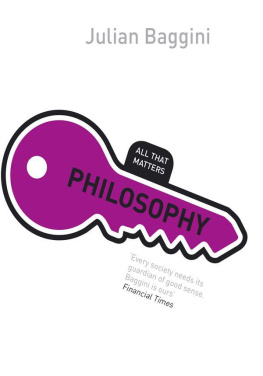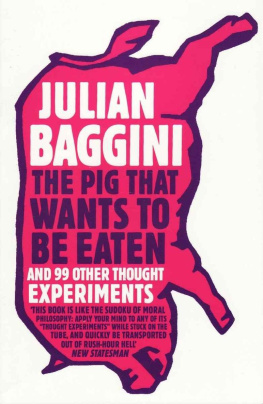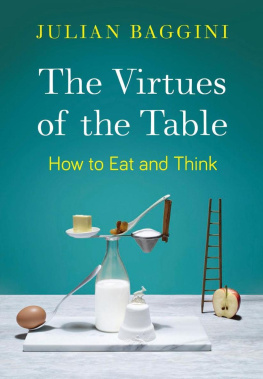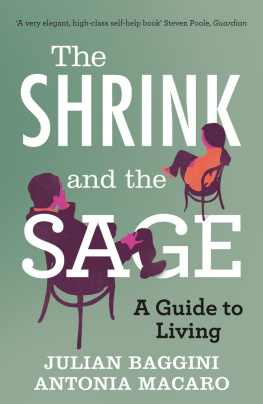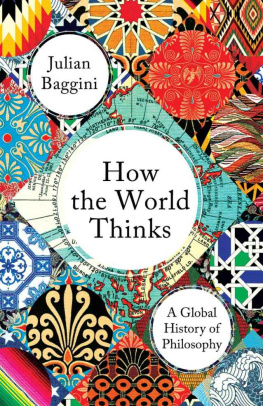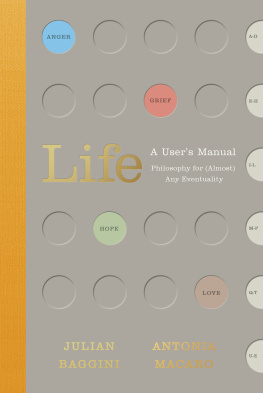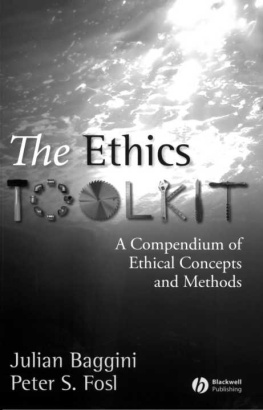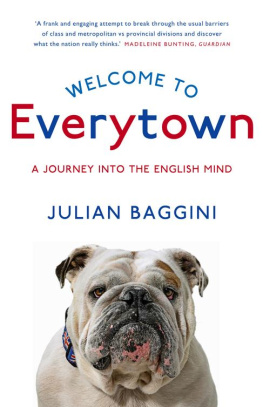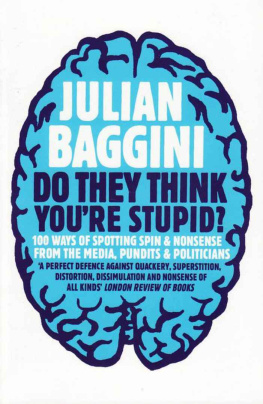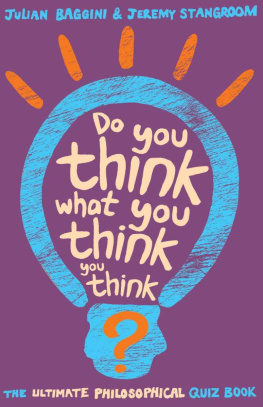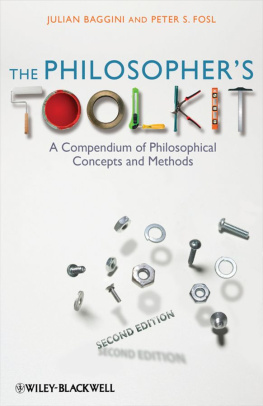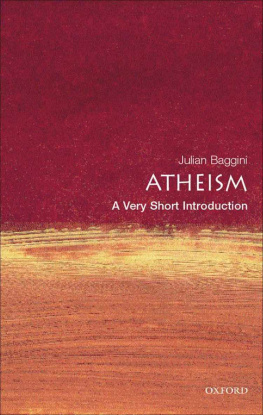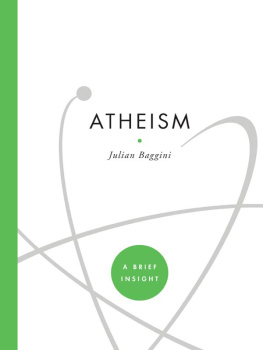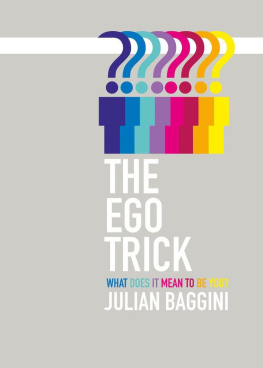PHILOSOPHY
Julian Baggini |  |
Contents
Acknowledgements
The author and publishers would like to thank the following for their permission to reproduce photos in this book. : Stan Pritchard / Alamy.
About the Author
Julian Baggini is a writer and journalist, who was recently named on the Observers list of Britains top public intellectuals. His doctorate was from University College London on the philosophy of personal identity, and his books have been published globally and translated into many languages around the world including Russian, Spanish and Korean.
Baggini is widely regarded as one of the most lucid and accessible writers of public philosophy. His work appears in national and international newspapers and magazines such as the Wall Street Journal, FT, Guardian, Independent, Asia Literary Review and Prospect and he co-founded The Philosophers Magazine.
Julian has also made cameo appearances in two Alexander McCall Smith novels, and been the subject of a question in University Challenge.
Follow Julian at:
www.julianbaggini.com
@microphilosophy
Why Philosophy Matters
Although it is fashionable in some quarters to put down human beings, most of us, if honest, would agree that Homo sapiens is a pretty amazing species. But when it comes to explaining what makes us different from (if not better than) the other animals, people radically disagree. People often point to our ability to use language or simply to our opposable thumbs, which can allow humans to manipulate physical objects much more intricately than any other animal. But neither of these seems to capture humanitys uniqueness. Other species may lack our rich and flexible language, but they still communicate. We may be more skilled at manipulating objects, but even chimps make basic tools.
So heres another suggestion: one which explains why were different, why philosophy lies at the heart of that difference and why philosophy matters.

The first philosopher
Consider early humans. They could talk, they made clothes, built huts and so on. Already they appear quite different from other animals. But in one important respect, they are just the same. When the bird flies south for winter, the beaver builds its dam or the lion hunts its prey, it does so simply because that is what it does . Our early human is exactly the same. She may be a bit better at thinking about which means can be used to achieve what end, but still, like a cat, she hunts, she eats, she reproduces, she shelters, she plays and she dies because that is what she does .
Then, one day, a human has a thought that perhaps nothing in the entire universe has had before: why should I do what I do? Instead of just killing a boar and eating it, she wonders whether this is the only way to live. You can imagine how this question would have gone down around the fire. Even today, people often struggle to explain why they do what they do. Think of how many people from older generations explain why they married young with the simple, It was just what you did in those days. Before our species first philosophical moment, everything was just what we did in those days.
Our original philosopher has, in effect, asked what has historically been one of the central questions of philosophy: Whats the point of it all? What is the meaning of life? From this question, all other philosophical questions follow, even those that appear to be quite abstract and far removed from everyday concerns.
For instance, if you ask how you should live, you are beginning to ask questions of ethics: what we ought to do, not just what we in fact do. There is increasing evidence that some other animals, particularly primates, are able to show compassion and have some sense of fairness and reciprocity. But although this points to some primitive ethical sense, none seems capable of reflecting on what it means to say we ought to do something. This marked the third major step forward in thinking. First, primitive minds simply perceived the world through the senses, representing the world as it is . Second, more sophisticated minds modelled that world and used imagination to represent it as it could be . What was entirely new when ethics emerged is that for the first time we think not just descriptively but normatively : about the world as it should be .
It is a small step from thinking about How ought I to live? to How ought we to live, together?, which leads us to political philosophy. Other animals have a politics of sorts. They organize themselves in social groups, have hierarchies and leaders, protocols and even implicit rules of conduct. What they do not do, however, is change these practices on the basis of reflection on the best ways to order their societies. This human ability is again of a radically unique kind, and it emerges from a basic ability to think philosophically about the normative dimension of life.
Having got this far, it would not escape our attention for long that this normative dimension extends beyond questions of how to live and that we also make value judgements about works or art, natural beauty and food and drink. We would have stumbled across another area of philosophy: aesthetics.

Digging deeper
What we can see is that once that first why? is asked, to answer one philosophical question, we have to dig deeper and address others that lie beneath it. And so the process continues. Thinking about how we ought to live, individually and in society, invites the question, What kind of creatures are we anyway? Another area, sometimes called philosophical anthropology, has been opened up: the nature of human life.
But to understand the nature of human beings we have to understand the nature of the universe we live in, and that leads us to metaphysics, and also to the question of whether or not anything is in charge of it all and so to the philosophy of religion. Still the questions get deeper. On what do we base our understanding of the universe? Above all, on science. But what exactly is that, and how does it work? We need a philosophy of science to find out.
Even science does not lie at the very base of our understanding. To do science, we first have to represent the world, in language and in perception. In a strange way, this brings us back full circle to where philosophy began. First we represented the world, then we questioned the world and finally we questioned our representation of the world.
The journey represents philosophys growth from birth to maturity, and it is in that maturity that some of the most difficult and abstract-seeming questions emerge: What is knowledge? What is truth? Can we ever obtain either? This take us into very deep waters. Consider, for instance, the question of whether philosophical problems have been discovered or invented. There is a sense in which they did not exist until people started to think about them. But the way I have told the story, it seems that, in another sense, these questions and issues were always there: they simply required human beings to stumble across them. So is philosophy itself a human construction or does it have some real existence of its own? This question shows philosophys distinctive need to constantly reflect upon itself and so to add layer on layer of reflection. If philosophy became an adult when it questioned our representation of the world, perhaps it only became fully mature when it became capable of questioning its own questioning.
Next page


 The first philosopher
The first philosopher Digging deeper
Digging deeper
